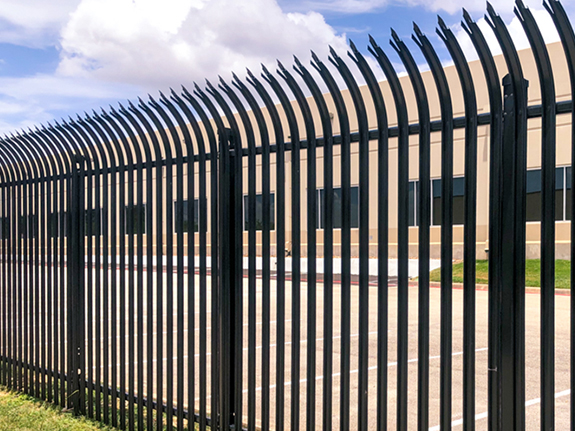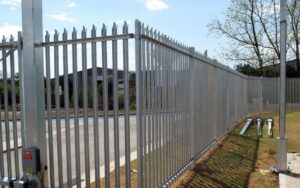
Key Considerations When Hiring a Commercial Fencing Contractor in Austin
When it comes to hiring commercial fencing contractors in Austin, there are several vital considerations that you should keep in mind. Firstly, it's essential to look for a contractor with a solid reputation and experience in the industry. Check their portfolio and client testimonials to understand their work quality and customer satisfaction.

Secondly, consider the specific requirements of your project. Are you looking for security fencing, privacy fencing, or ornamental fencing? Ensure the contractor specializes in the type of fencing you need and has the necessary expertise.
Another crucial consideration is the contractor's licensing and insurance. Ensure they are appropriately licensed to operate in Austin and have liability insurance to protect against unforeseen damages or accidents during the project.
Moreover, discussing timelines and project schedules with the contractor is essential. Clarify the expected start and completion dates to avoid delays or conflicts.
Lastly, consider the cost and budget for your project. Obtain detailed quotes from multiple contractors and compare their pricing and services. On the other hand, extremely low bids should be avoided as they could be a sign of poor craftsmanship or inferior materials.
How to Choose the Right Commercial Fencing Contractor for Your Project
Choosing the right commercial fencing contractor for your project is crucial to its success. Here are some critical steps to help you make the best decision:
Define your project requirements: Clearly outline your fencing needs, including the type of fencing, materials, height, and any specific features required. This will help you find a contractor with expertise in your particular project.
Research and gather recommendations: Seek recommendations from trusted sources and conduct thorough research online. Look for contractors with a strong reputation, positive reviews, and a portfolio of completed projects that align with your needs.
Check licensing and insurance: Ensure the contractor holds the necessary licenses and permits to operate in your area. To shield you from potential risks, be sure they are adequately insured, especially for worker's compensation and liability.
Request detailed quotes: Obtain quotes from multiple contractors and compare their offerings. Consider materials, labor costs, project timeline, warranties, and any additional services provided.
Interview potential contractors: Schedule meetings with the shortlisted contractors to discuss your project in detail. Ask about their experience, previous projects, and how they handle challenges or changes during construction.
Review contracts carefully: Before signing any contracts, review all terms and conditions carefully. Pay attention to project milestones, payment schedules, warranties, and dispute resolution processes.
Communication and rapport: Choose a contractor who communicates effectively and understands your vision. A good working relationship and open lines of communication are essential throughout the project.
Understanding the Role of a Commercial Fencing Contractor in Austin
A commercial fencing contractor plays a crucial role in constructing and installing fences for commercial properties in Austin. Their expertise extends beyond basic structure, and they bring valuable skills and knowledge to the table. Here's an overview of the key responsibilities and roles of a commercial fencing contractor:

Project assessment and planning: A commercial fencing contractor begins by assessing the project requirements and working with the client to develop a comprehensive plan. They consider the fence's purpose, site conditions, local regulations, and budgetary constraints.
Material selection: Based on the project requirements and client preferences, the contractor assists in selecting the appropriate materials for the fencing project. They consider factors like durability, security, aesthetics, and maintenance requirements.
Permit acquisition: Commercial fencing contractors know local building codes and regulations. They navigate the permit acquisition process on behalf of the client, ensuring compliance with all requirements.
Construction and installation: The contractor oversees the construction and installation process once the planning and material selection is complete. They coordinate with the client, subcontractors, and suppliers to ensure the smooth execution of the project.
Quality assurance: A commercial fencing contractor maintains quality standards throughout the project. They conduct inspections, address issues promptly, and ensure that the final product meets the client's expectations.
Post-installation support: After the fence is installed, the contractor provides necessary documentation, such as warranties and maintenance guidelines. They may also offer ongoing maintenance and repair services to ensure the fence's longevity.
Tips for Negotiating Pricing and Contracts with Commercial Fencing Contractors
Negotiating pricing and contracts is an essential aspect of the process when engaging with commercial fencing contractors. Here are some tips to help you navigate this stage successfully:
Obtain multiple quotes: Contact commercial fencing contractors and request detailed quotes for your project. Numerous options allow you to compare pricing and services, giving you leverage during negotiations.
Clarify project requirements: Communicate your project requirements to each contractor. This includes the type of fencing, materials, dimensions, and any specific features you desire. The more specific you are, the more accurate the quotes and negotiations will be.
Seek clarification on pricing: Ask the contractors to break down the cost estimates, including materials, labor, permits, and any additional charges. This will help you understand the pricing structure and identify areas where you can negotiate or make adjustments.
Be open to alternatives: Discuss alternative materials or design options with the contractors if the initial quotes exceed your budget. They can suggest cost-effective options without compromising quality or functionality.
Negotiate terms and conditions: Review the contracts carefully and negotiate any unfavorable or unclear terms. This may include payment schedules, warranties, project timelines, and dispute resolution processes. Be open to compromise and ensure that both parties agree with the agreed-upon terms.
Consider long-term value: While pricing is important, consider the project's long-term value. Quality materials and artistry may result in lower maintenance costs and more excellent durability, making them a worthwhile investment.
Maintain open communication: Clear and open communication is critical during negotiations. Clearly express your expectations, concerns, and requirements, and listen to the contractor's perspective. A collaborative approach can lead to a mutually beneficial agreement.
5. Evaluating the Quality of Work by Commercial Fencing Contractors in Austin
Evaluating the quality of work provided by commercial fencing contractors in Austin is crucial to ensure you choose the right contractor for your project. Here are some factors to consider when assessing their work:

Portfolio and references: Review the contractor's portfolio to see examples of their previous projects. Look for diversity in project types and styles to assess their versatility and expertise. Additionally, ask for references and contact previous clients to inquire about their satisfaction with the contractor's work.
Site visits: Visit some of the contractor's completed projects in person. This allows you to evaluate the quality of their artistry, attention to detail, and the overall durability and appearance of the fences.
Material selection: Examine the materials used in the contractor's past projects. High-quality materials contribute to the longevity and performance of the fence. Ensure that the contractor uses reputable suppliers and can provide information about the materials they use.
Reviews and ratings: Check online reviews and ratings for the contractor. Look for patterns in customer feedback regarding work quality, reliability, and professionalism. Consider both positive and negative reviews to get a comprehensive understanding.
Certifications and affiliations: Verify if the contractor holds any certifications or affiliations with industry organizations. These can indicate a commitment to high standards and ongoing professional development.
Warranty and after-sales support: Inquire about the contractor's warranty policy and after-sales support. A reputable contractor should stand behind their work and assist in case of any issues or concerns that may arise after the completion of the project.
Attention to detail: Assess the contractor's attention to more information in their past projects. Look for clean and precise installations, well-aligned fences, and adequately finished edges. These are signs of meticulous artistry.
With over 15 years of experience in the industry, Travis Fencing brings a wealth of knowledge and skill to every project. Our long-standing presence in Austin has equipped us with a deep understanding of local requirements and preferences, enabling us to deliver fencing solutions that are perfectly suited to the Texan climate and lifestyle. Our vast portfolio of completed projects, spanning residential, commercial, and public properties, is a testament to our wide-ranging experience and adaptability.